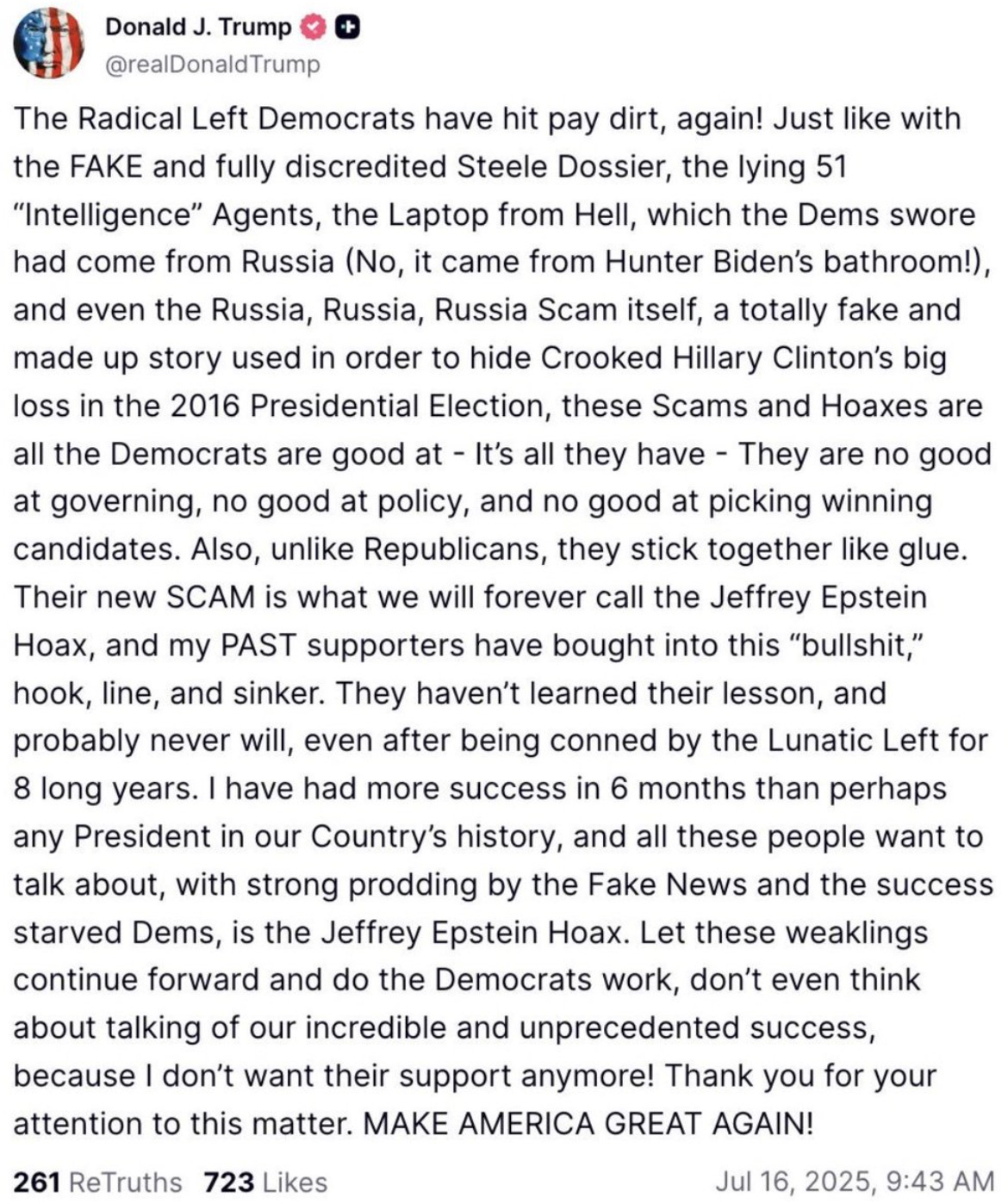Why Republicans Need to Address the Epstein Files Now
Nearly 70 percent of voters think the government is covering something up
This week, the House was supposed to move four cryptocurrency bills, giving the spate of legislative action the moniker “crypto week.” However, the week has turned out to be a frustrating one for Republicans, both related to crypto week and elsewhere.
The featured bill for crypto week is the GENIUS Act, S. 1582, which has already passed the Senate, making the House the last stop. The rest of the bills, more likely than not, don’t stand a chance of passage in the Senate. A group of conservatives has, at least through Wednesday, blocked the rule providing for consideration of the GENIUS Act and the other bills alike.1
The other source of frustration is the continued fumbling of the Epstein files by Trump and his administration. On Monday, I offered a look at the politics of the fallout from the utter lack of transparency regarding the Epstein files. That view really hasn’t changed. In fact, it has been amplified by events of the past couple of days.
As expected, the House Rules Committee wouldn’t allow an amendment offered by Rep. Ro Khanna (D-CA) to go to the floor for consideration, which would have required the retention and release of documents related to the Epstein files. The only Republican who voted for the amendment in Rules was Rep. Ralph Norman (R-SC).2 However, some chaos unfolded on the floor on Tuesday during a routine procedural vote on the previous question.3
During the debate on the rule for the crypto bills, Rep. May Gay Scanlon (D-PA) signaled that she would “offer an amendment to make in order amendment No. 50 to H.R. 3633, offered by Representative Khanna, which requires the Attorney General to preserve and release any records related to Jeffrey Epstein.”
As the Washington Post explains, members of the Republican whip team “were seen working to persuade holdouts from the ultraconservative House Freedom Caucus, who appeared willing to join with Democrats to approve the Khanna resolution.” The Post also notes that Rep. Andrew Clyde (R-GA) “was seen yelling” at the floor director for the Republican whip, and that Rep. Andy Biggs (R-AZ) “chose not to cast a vote.” Republicans managed to defeat the previous question by one vote.
Khanna has now joined Rep. Thomas Massie (R-KY) in pushing for a floor vote in the House through the discharge petition process. In other words, Massie and Khanna need the signatures of 218 members to discharge the rule, H.Res. 581, to bring the vehicle, H.R. 185, to the floor. The rule substitutes the text of the Epstein Files Transparency Act.
Since Massie and Khanna will seek to discharge a rule, the process is quicker. They can begin gathering signatures seven days after H.Res. 581 is referred to the House Rules Committee. Once the discharge petition reaches 218 signatures and the measure is placed on the Calendar, any member who signed the discharge petition can notify the House of his or her intent to make the motion to discharge. A vote must be scheduled within two legislative days.
Now, the House Rules Committee can try to kill the discharge petition through a rule for unrelated legislation. You may recall that the opening paragraph explained that a group of conservatives has defeated a rule on the floor for four cryptocurrency bills. Further complicating any attempt to kill the discharge is the fact that six Republicans have cosponsored H.Res. 581. Those members are Reps. Lauren Boebert (R-CO), Tim Burchett (R-TN), Eric Burlison (R-MO), Eli Crane (R-AZ), Marjorie Taylor Greene (R-GA), and Jeff Van Drew (R-NJ). That’s more than enough to take down a rule.4 Republican leadership can’t lose more than three of their own on any vote requiring a simple majority.5
Of course, Trump continues to do himself no favors. On Tuesday, he claimed the files “were made up” by former FBI Director James Comey, former President Barack Obama, and former President Joe Biden. Keep in mind that Epstein was arrested in July 2019 and committed suicide in August 2019. For those keeping score at home, that was during Trump’s first term.
Just today, Trump blamed “Radical Left Democrats” for the controversy surrounding the Epstein files. He also took a shot at his “PAST supporters” who “have bought into this ‘bullshit,’ hook, line, and sinker.” Trump views anyone pushing for the release of the files as a “past supporter.”
Folks, keep in mind that Trump has played into the conspiracy theory about Epstein’s suicide and the files since at least 2020. He talked about the Epstein files during the 2024 campaign. One of his official campaign accounts even tweeted about it, including a clip from an interview with Fox News in which he was asked about the Epstein files.
One of Trump’s most notable far-right supporters is warning that the Epstein files dilemma could “consume” Trump’s second term. Absolutely, it could. It doesn’t matter if there’s anything about Trump in the files or not. I’m inclined to believe there probably isn’t anything in the files. The obfuscation doesn’t send the best message, though. It also further erodes trust in government at a moment when that trust has already withered away. Look at the results from the most recent YouGov survey. Nearly 70 percent of registered voters think the government is covering up evidence it has about Epstein. Only 8 percent think the government isn’t covering anything up.
Then, in the same survey, take a look at Trump’s approval rating. He’s underwater by 11 points with registered voters and 35 points with independent voters.6 This is after the passage of the so-called “One Big Beautiful Bill Act” (OBBBA). He didn’t get a bump from it.
With the caveat that there are more than 470 days until the midterms, the Epstein files pose a more significant problem for Republicans than other pressing issues–such as inflation, the economy, and jobs–due to the potential impact on the party base.
Right now, Trump and most Republicans are playing into the hands of Democrats with the chaos and lack of direction on how to best handle the Epstein files.. If the drama around this issue isn’t solved and this continues to hang over the heads of Trump and congressional Republicans, the party’s base may not be nearly as motivated as they were in 2024 to show up to the polls. And with the way independents view Trump right now, Republicans need every base voter they can get to show up.
Technically, the second vote on the rule for the crypto bills, H.Res. 580, is still open as I write this. The vote started around 1:19 pm.
Scroll down to vote number 149.
I say procedural votes are “routine” because that’s they were in the past. More recently, procedural votes have been essentially the last chance for conservatives to air their grievances. Hyper-partisanship and a narrow majority have made these procedural votes much more interesting.
It wouldn’t be the first time in the 119th Congress that a rule went down because House Republican leadership tried to kill a discharge petition. H.Res. 282 included language to block the discharge petition for H.Res. 164, which, if approved, would’ve set up a vote on H.Res. 23. H.Res. 23 would’ve changed the Rules of the House of Representatives to provide for parental proxy voting. Nine Republicans voted to take down H.Res. 282. Rep. Anna Paulina Luna (R-FL) eventually struck a deal with Speaker Mike Johnson (R-LA) to avoid the showdown.
Rep. Mark Green (R-TN) will resign on Monday. His resignation brings Republicans’ majority down to 219 seats. Come Monday, a simple majority is 216. Burchett, Crane, and Greene are among the group of Republicans who voted on Tuesday to take down the rule for the crypto bills.
He’s underwater by 29 points with leaners.




